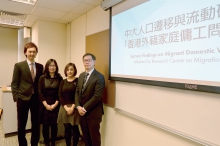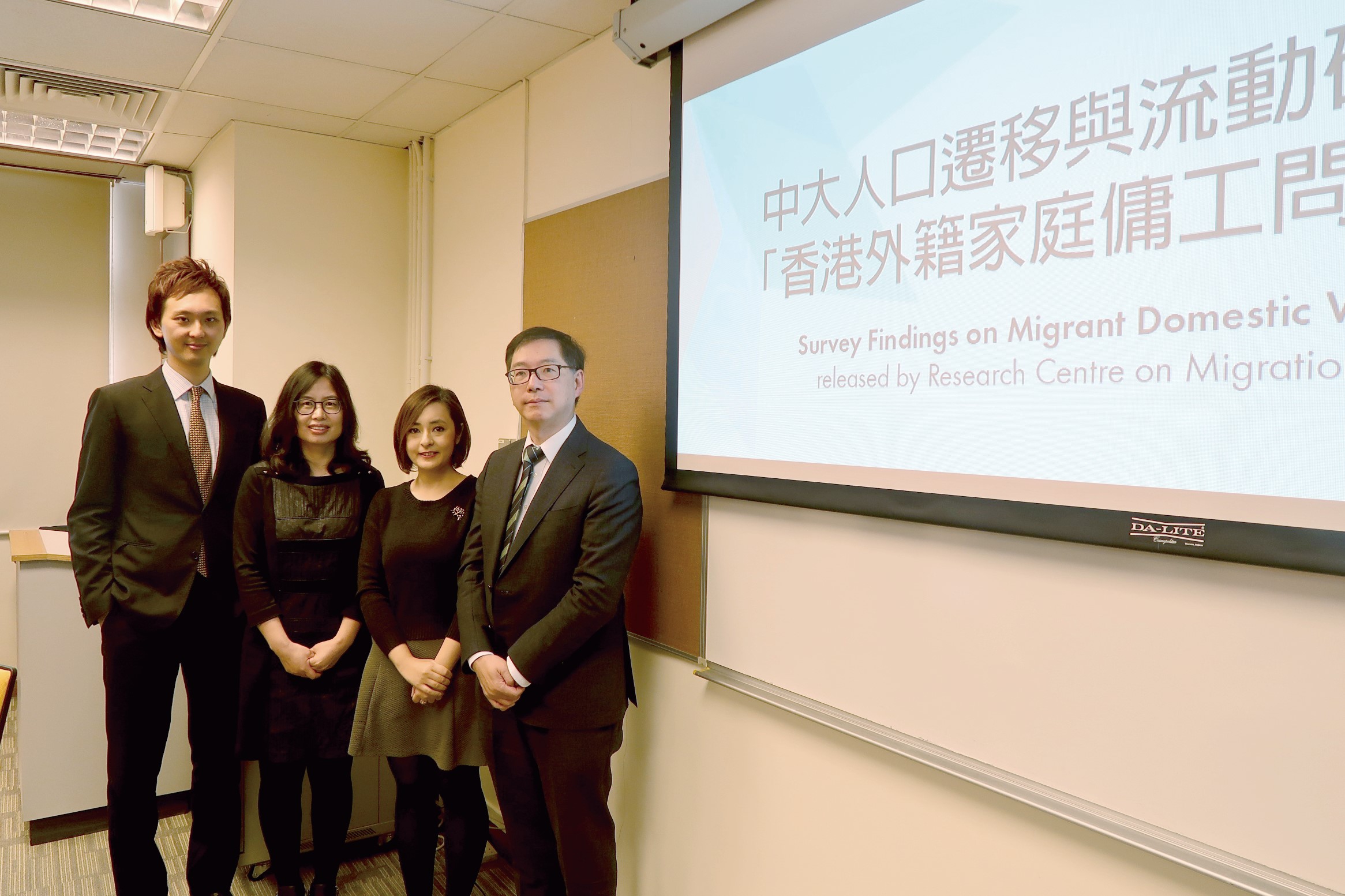News Centre
Survey Findings on Migrant Domestic Workers in Hong KongReleased by The Research Centre on Migration and Mobility at CUHK
The Research Centre on Migration and Mobility (RCMM) of the Department of Sociology at The Chinese University of Hong Kong (CUHK) announced the survey results on Migrant Domestic Workers (MDWs) in Hong Kong today (13 February). The results showed that current employment conditions and the health status of MDWs in Hong Kong deserve more social attention. As most of them face many working problems and need emotional support, social service organisations should improve the support system for MDWs.
Employment Conditions and Health Status among MDWs in Hong Kong
The survey was conducted from May to September 2017 by the research team in RCMM. It successfully interviewed 2,017 MDWs from the Philippines and Indonesia. The results showed that the employment conditions for MDWs remain poor. 43.9% do not have their own private room, 70.6% work over 13 hours per day, 34.6% need to work on their day-off, 5.9% have no day-off in a week, 23.7% do not have a day-off for all statutory holidays, 28.6% feel discriminated against, 3.9% are physically abused by their employer, 7.3% have never received their wage on time, 8% are earning less than the statutory monthly required salary, 51.3% still have to pay their home agency and 46% still have to pay a local agency.
When compared with local residents, MDWs are less healthy, probably due to their bad work conditions. The health-related quality of life was assessed using the 12-item Short-Form Health Survey version 2 (SF-12 v2). SF-12 v2 is a generic measure of health that consists of 2 components, namely a physical component summary (PCS) and a mental component summary (MCS). Both components score from 0 to 100, where a higher score represents a better health-related quality of life. While the scores of PCS and MCS among local adults, according to a survey conducted in 2018, are 51.8 and 55.5 respectively, those of MDWs are 47.1 for PCS and 44.7 for MCS. After adjusting for confounding factors, the result showed that never receiving wages on time, working on days off, and paying agency fees led to a lower PCS score; while not receiving wages on time, feel discriminated against and physical abuse by the employer led to a lower MCS score.
Human Capital, Social Capital, and Right Protection
Human and social capital accumulation can affect workers’ bargaining power. The survey results indicated that although MDWs may be constrained from using their capital accumulation to improve their market value substantially, capital accumulation gives MDWs some leverage to bargain for a better working condition and protect their human rights. In terms of human capital, previously having past work experience can reduce the likelihood of experiencing underpay and increase the likelihood of being paid more than the legal minimum salary. English language proficiency also gives them some leverage in rising up the pay scale. Previous human capital accumulation is associated with having a private room in an employer’s house, as well as a better protected human rights such as not having to experience wage arrears. For social capital, frequent participation in Sunday gatherings is also associated with their rights being better protected.
The Use of Labour and other Supportive Services
The current survey found that MDWs would seek help from different sources according to the nature of the problem. More than 70% of MDWs would approach a formal supportive network, such as the Consulate, the Labour Department and employment agencies, for contract-related issues, while they would approach an informal supportive network mainly for emotional support. More than 50% of the interviewees think their friends in Hong Kong could provide emotional support, but more than 60% of them indicated they would not talk to friends about financial matters. Thus, there is a clear differentiation between help seeking channels.
However, the low usage and response rates from local services are alarming. Although most interviewees would approach the Labour Department and Immigration Department for help, one third of the interviewees indicated they could not receive appropriate support. Only 4% of the interviewees would approach social workers when they encounter any problem. This shows that they are not familiar with existing dedicated services for MDWs provided by the social service organisations, which aim to providing a holistic one-stop service for MDWs. The lack of awareness on the possibility of seeking help from these dedicated service units could lead to fragmented and insufficient support for MDWs.
About The Research Centre on Migration and Mobility
The Research Centre on Migration and Mobility was established in May 2016 by the Department of Sociology at CUHK. The Centre engages in a wide range of research activities concerning the causes and consequences of migration in Hong Kong and other Asian countries. The Centre has been organising research seminars, workshops, and conferences to link colleagues who are interested in migration. More information is available at http://www.cuhk.edu.hk/rcmm/index.htm

(From right) Prof. Eric Wai-ching FONG, Chairman, Department of Sociology; Prof. Raees Begum BAIG, Assistant Professor, Department of Social Work; Prof. Yuying TONG, Associate Professor, Department of Sociology; and Prof. Roger Yat-nork CHUNG, Assistant Professor, The Jockey Club School of Public Health and Primary Care, CUHK
